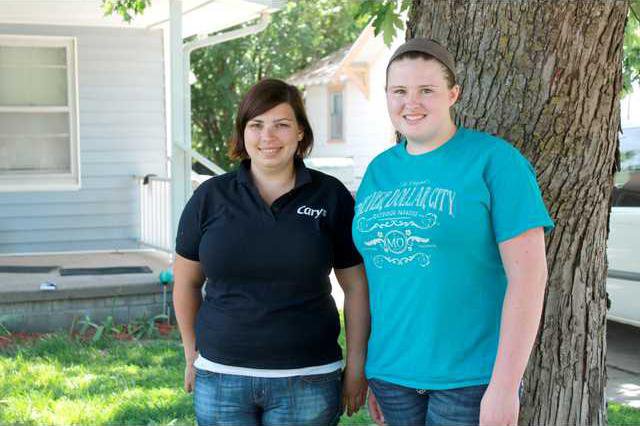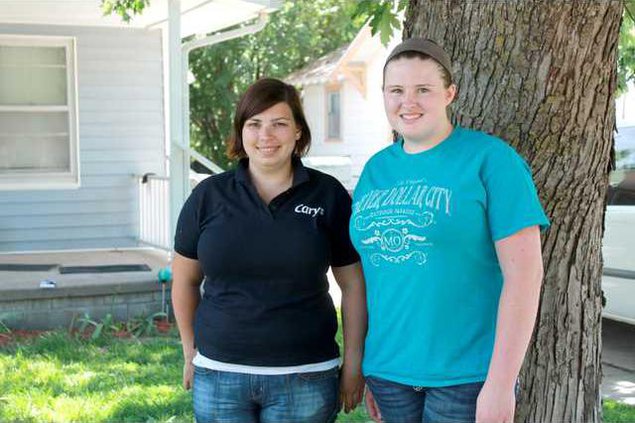ELLINWOOD — Carys Vaughan, a college student from Pembrokeshire, Wales, is an Interviewed International Four-H Youth Exchange student staying with the Taff and Wendy Hughes family in Ellinwood. She is halfway through her five week stay in the United States.
Instead of the cool, wet hills of Wales where flies are the biggest nuisance, she is learning to cope with the mosquitoes that have suddenly appeared after much needed rains in the past few weeks. She’s also acclimating to the drier weather and the comparative flatness of the region. In true traveler spirit, she is taking the differences in stride. Meeting on the front porch of the Hughes’ Ellinwood home, she shared about what drew her to the IFYE program.
“I love to travel, and I thought, what better way than to do it with an organization I love,” she said. “This way, I can experience things I wouldn’t if I were on a touristy vacation.”
After spending time with another farm family in northeast Kansas, Vaughan came to stay with Wendy Hughes and her children Mikey and Zeb while Taff was away custom cutting. Mikey hopes to be an IFYE student herself one day.
The IFYE program began at the end of World War II when students asked the question, “Why can’t we solve our problems in a more humane way?” which led to two-way cultural exchange program in 1948.
This is the second exchange Vaughan has taken part in. Her first, last year, was to neighboring Ireland. The experience went so well, she decided to go further this time. As it turns out, the Hugheses are familiar with her home country, as they have traveled there twice to visit relatives, something which fueled Mikey’s interest in the international exchange program. Hosting may be the first step in her journey to become an IFYE student.
Comparisons
Vaughan grew up on a dairy farm, and as a sideline, her family raises Christmas turkeys. She has witnessed some striking differences in farming and livestock management between the cool, wet hills of Wales and the flat, dry prairie of Kansas. In Wales, one acre of pasture will support a cow. That’s because the grass grows much thicker and faster there. Here, it takes about five times as much ground to support one head of cattle.
Fields of grain are much smaller in Wales also, she said. While preparing to help the Hughes family with harvest, she learned the average field in this area is around 200 acres.
“Our whole family farm isn’t even 200 acres,” she said. Instead, a 10 acre field is about normal. The size of equipment, therefore, is also smaller in Wales.
Encouraging young farmers
Before she returns, there are two items on her list she needs to put a check by.
“I want to see a rodeo and I want to find a proper pair of boots,” she said.
Fitting those in won’t be a problem, but unfortunately, she’ll miss the 2014 Barton County Fair by two days. She will arrive back home in the nick of time to attend her graduation the next day, where she will be awarded a master’s degree in Town Planning.
“In Wales, everything you do with land needs to be approved by planning commissions,” she said. “I work as a rural planning consultant, and helping young farmers is something I’m really passionate about.”
She has been active with the Wales National Federation of Young Farmers Club since she was a teen, and currently holds a position as a coordinator between young farmers and the Farmers Union of Wales. The organization guides them through the process of applying for grants and opportunities to take over farms. There is even a scholarship, or “bursary,” program where apprentice farmers run a farm for a year, and receive grants to purchase livestock, which they can then take with them when the year is over to their own start-up, she said.
“This is really a fantastic deal, because it is very expensive to get started in farming in Wales,” she said. “It’s nearly impossible for a young person to buy a farm because if land is for sale, it is bought for crazy ridiculous prices.”
The average age of a farmer is decreasing in Wales, despite this. Today, it’s about 40 years old, Vaughan said. That’s because with increasing amounts of paperwork and government regulations, parents are passing on farms at younger ages, she said. Universities, too, are providing dynamic agriculture and agronomy classes. In fact, in rural Wales, Vaughan said it isn’t uncommon for young children, both boys and girls, to say they want to grow up to be farmers.
Like the United States, the United Kingdom is actively promoting agricultural careers, which have seen a decline in popularity in favor of other fields of study, making this a very positive development.
While Vaughan plans to do her part for agriculture through planning, her brothers hope to continue the family dairy just as soon as her parents are ready to pass it on to them.
Wales 4-H member visiting Ellinwood





